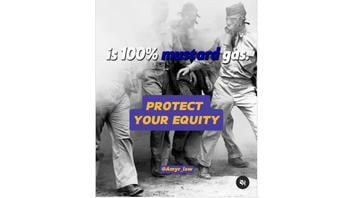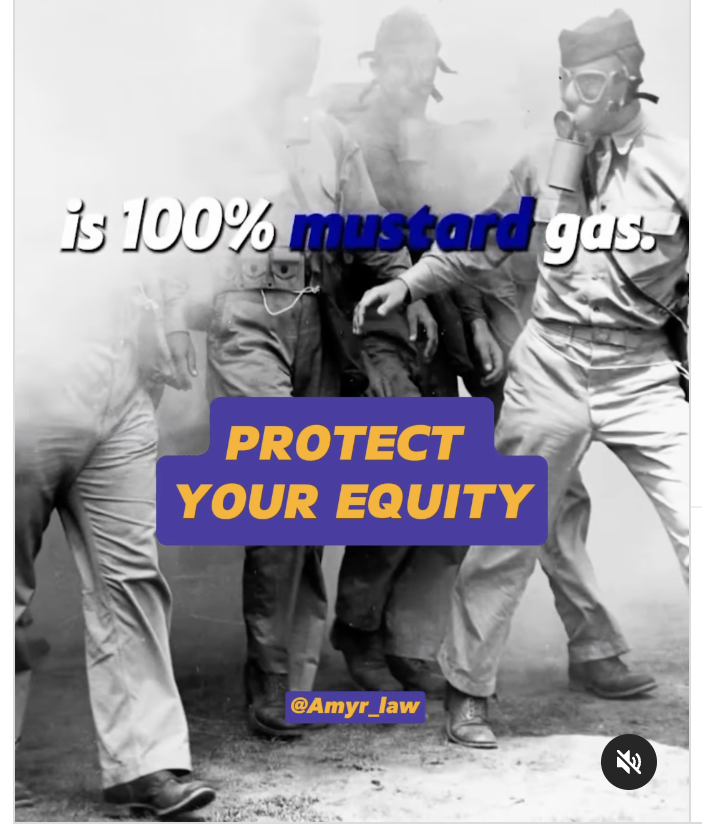
Do chemotherapy drugs consist of "100% mustard gas," as a post on Instagram claimed? No, that's not true: The National Cancer Institute told Lead Stories that its records do not indicate any forms of chemotherapy drugs are known to contain "100% mustard gas." One group of chemotherapy drugs, alkylating agents, contain a less toxic mustard gas derivative known as nitrogen mustard. However, not all chemotherapy drugs contain nitrogen mustard.
The claim appeared in a post on Instagram on February 29, 2024, (archived here) with a person on-camera who said "the chemotherapy is 100% mustard gas." A caption with the post read:
THE MORE YOU KNOW‼️
Your body is a part of your estate!
You need to protect it at all costs!
Comment 'STUDENT' to learn how to protect your natural rights under the original constitution!
Let's go!
MatisseAcademy.com
-for entertainment & educational purposes only-
This is how the post appeared at the time of writing:
(Source: Instagram screenshot taken Fri March 1 07:41:40 UTC 2024)
The man speaking in the video identifies himself online as Yahki Awakened. He runs an online herbal supplements company. Lead Stories has written articles previously about his claims; those are articles are here. On its website (archive), the store touts the claim that the "Body Was Created To Heal & Regenerate Itself." In the video, the speaker stated that because "mustard gas is literally 100% acidic," chemotherapy will not only "kill the cancerous cells" but also will kill "every good cell in the body too. So, chemotherapy naturally causes cancer."
Due to its anti-tumor properties, mustard gas was studied in the 1940s as a cancer treatment. One group of chemotherapy drugs used in 2024, alkylating agents, contain a less toxic derivative of mustard gas known commonly as nitrogen mustard. However, not all chemotherapy drugs contain nitrogen mustard.
The National Cancer Institute (NCI) told Lead Stories that its records do not indicate any forms of chemotherapy drugs are known to contain "100% mustard gas," writing in an email received on March 7, 2024:
The National Cancer Institute disseminates evidence-based, scientifically accurate information about cancer to the public. It does not appear from a search of our resources that the NCI maintains information supporting the claim.
Mustard gas was initially used in WWI chemical warfare
Mustard gas, or sulfur mustard, is described by the Centers for Disease Control and Prevention (archive) as a "human-made chemical warfare agent that causes blistering of the skin and mucous membranes on contact."
Named for its odor that sometimes smells like mustard, mustard gas is also known as a "mustard agent." It affects people who are exposed through skin or eye contact, inhalation or eating contaminated food. According to the Organisation for the Prohibition of Chemical Weapons (archive), mustard gas in this form is prohibited under the 1925 Geneva Protocol, which bans the use of chemical and bacteriological, or biological, weapons in war.
Multiple forms of chemotherapy
Chemotherapy is a drug treatment that uses powerful chemicals to kill fast-growing cancer cells in the body, according to the Mayo Clinic (archive). A course of treatment depends on the type and progression of a given cancer and can be given in a variety of ways, primarily intravenous infusions or oral pills.
Stanford Medicine (archive) notes that there are five primary groups of chemotherapy drugs, including alkylating agents, which use nitrogen mustard -- a derivative of mustard gas -- to prevent cancer cells from actively dividing.
Alkalyating agents (archive) damage the DNA of healthy and cancerous cells from reproducing. This group of chemotherapy drugs are used to treat multiple types of cancer, including cancers of the lung, breast and ovary, as well as leukemia, lymphoma, Hodgkin's disease, multiple myeloma and sarcoma, according to the American Cancer Society (ACS) (archive).
Generally, cancer cells divide faster than healthy ones, so they are more sensitive to the toxic effects of alkylating agents that include nitrogen mustard (archive). But these drugs do not exclusively work on cancer cells (archive) and, as ACS notes, can also damage healthy cells:
In rare cases, this can lead to leukemia. The risk of leukemia from alkylating agents is 'dose-dependent,' meaning that the risk is small with lower doses, but goes up as the total amount of the drug used gets higher. The risk of leukemia after getting alkylating agents is highest about 5 to 10 years after treatment.
Some alkylating agents today have a chemical structure (archive) similar to mustard gas. These include the drugs cyclophosphamide (archive), ifosfamide (archive), bendamustine (archive), chlorambucil (archive), melphalan (archive), and mechlorethamine (archive).
Researched in WWII as cancer treatment
Following World War I, medical researchers noticed that mustard gas destroyed the lymphatic tissue and bone marrow of those exposed, a discovery that the Yale School of Medicine (archive) reports spurred the notion that the gas might also be able to kill cancer cells in the lymph nodes.
At the onset of U.S. involvement in World War II in 1942, researchers and the military conducted research using mustard gas and its derivatives to find a cancer treatment, according to a 2007 paper published in the Bulletin of the History of Medicine (archive). These early programs launched research examining alkylating agents as a form of chemotherapy still used today, according to a 2017 article published in the Canadian Medical Association Journal (archive).
A more complete historical look into the development of modern chemotherapy is in this 2008 article published in the journal Cancer Research (archived here).
Read more
Other Lead Stories fact checks of claims related to health and disease issues are here.


















